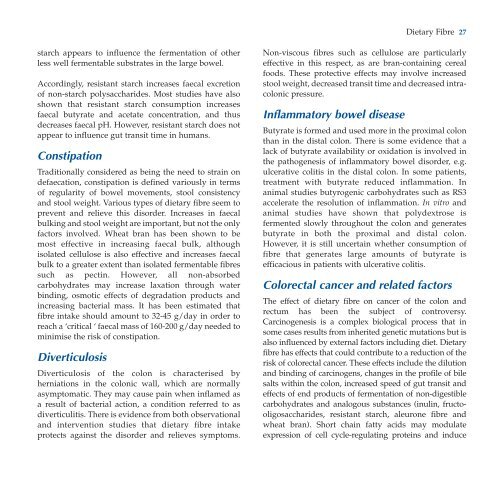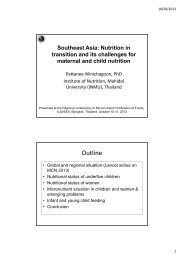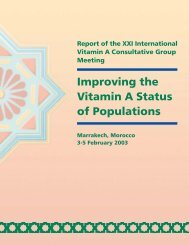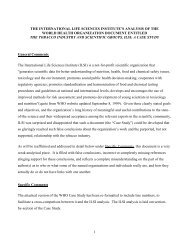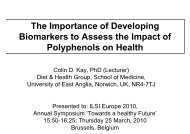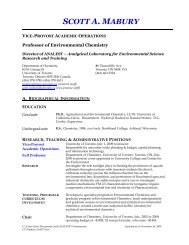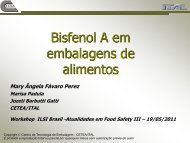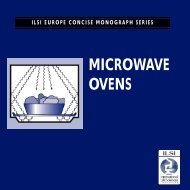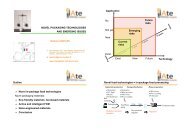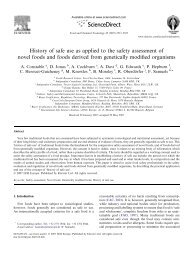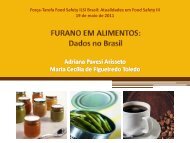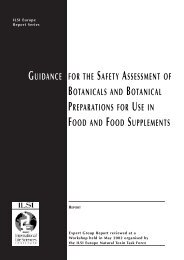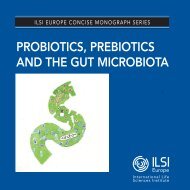Dietary Fibre - ILSI Argentina
Dietary Fibre - ILSI Argentina
Dietary Fibre - ILSI Argentina
Create successful ePaper yourself
Turn your PDF publications into a flip-book with our unique Google optimized e-Paper software.
<strong>Dietary</strong> <strong>Fibre</strong> 27<br />
starch appears to influence the fermentation of other<br />
less well fermentable substrates in the large bowel.<br />
Accordingly, resistant starch increases faecal excretion<br />
of non-starch polysaccharides. Most studies have also<br />
shown that resistant starch consumption increases<br />
faecal butyrate and acetate concentration, and thus<br />
decreases faecal pH. However, resistant starch does not<br />
appear to influence gut transit time in humans.<br />
Constipation<br />
Traditionally considered as being the need to strain on<br />
defaecation, constipation is defined variously in terms<br />
of regularity of bowel movements, stool consistency<br />
and stool weight. Various types of dietary fibre seem to<br />
prevent and relieve this disorder. Increases in faecal<br />
bulking and stool weight are important, but not the only<br />
factors involved. Wheat bran has been shown to be<br />
most effective in increasing faecal bulk, although<br />
isolated cellulose is also effective and increases faecal<br />
bulk to a greater extent than isolated fermentable fibres<br />
such as pectin. However, all non-absorbed<br />
carbohydrates may increase laxation through water<br />
binding, osmotic effects of degradation products and<br />
increasing bacterial mass. It has been estimated that<br />
fibre intake should amount to 32-45 g/day in order to<br />
reach a ‘critical ‘ faecal mass of 160-200 g/day needed to<br />
minimise the risk of constipation.<br />
Diverticulosis<br />
Diverticulosis of the colon is characterised by<br />
herniations in the colonic wall, which are normally<br />
asymptomatic. They may cause pain when inflamed as<br />
a result of bacterial action, a condition referred to as<br />
diverticulitis. There is evidence from both observational<br />
and intervention studies that dietary fibre intake<br />
protects against the disorder and relieves symptoms.<br />
Non-viscous fibres such as cellulose are particularly<br />
effective in this respect, as are bran-containing cereal<br />
foods. These protective effects may involve increased<br />
stool weight, decreased transit time and decreased intracolonic<br />
pressure.<br />
Inflammatory bowel disease<br />
Butyrate is formed and used more in the proximal colon<br />
than in the distal colon. There is some evidence that a<br />
lack of butyrate availability or oxidation is involved in<br />
the pathogenesis of inflammatory bowel disorder, e.g.<br />
ulcerative colitis in the distal colon. In some patients,<br />
treatment with butyrate reduced inflammation. In<br />
animal studies butyrogenic carbohydrates such as RS3<br />
accelerate the resolution of inflammation. In vitro and<br />
animal studies have shown that polydextrose is<br />
fermented slowly throughout the colon and generates<br />
butyrate in both the proximal and distal colon.<br />
However, it is still uncertain whether consumption of<br />
fibre that generates large amounts of butyrate is<br />
efficacious in patients with ulcerative colitis.<br />
Colorectal cancer and related factors<br />
The effect of dietary fibre on cancer of the colon and<br />
rectum has been the subject of controversy.<br />
Carcinogenesis is a complex biological process that in<br />
some cases results from inherited genetic mutations but is<br />
also influenced by external factors including diet. <strong>Dietary</strong><br />
fibre has effects that could contribute to a reduction of the<br />
risk of colorectal cancer. These effects include the dilution<br />
and binding of carcinogens, changes in the profile of bile<br />
salts within the colon, increased speed of gut transit and<br />
effects of end products of fermentation of non-digestible<br />
carbohydrates and analogous substances (inulin, fructooligosaccharides,<br />
resistant starch, aleurone fibre and<br />
wheat bran). Short chain fatty acids may modulate<br />
expression of cell cycle-regulating proteins and induce


